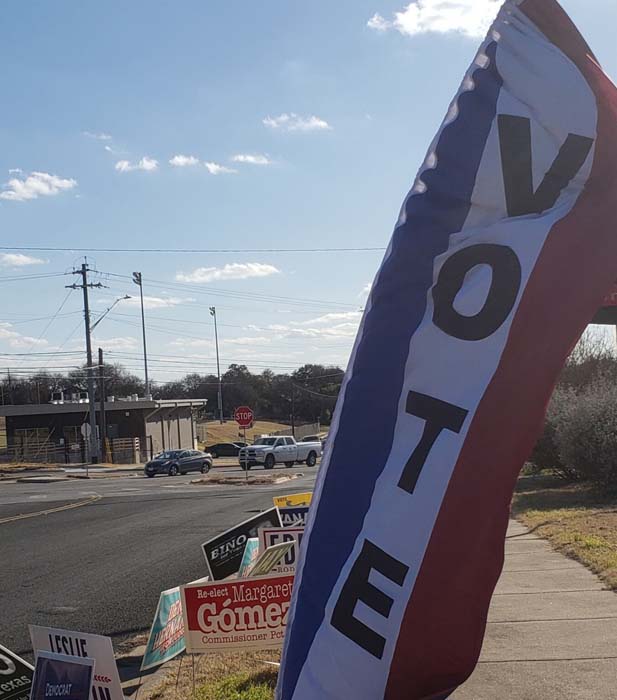Patchwork elections: Voter access varies wildly after federal legislation fails
Published 3:45 pm Tuesday, February 8, 2022

- Of the 23 states analyzed by CNHI statehouse reporters, lawmakers in at least 16 states have or are actively seeking to install more restrictive elections regulations.
AUSTIN, Texas — In the first days of early voting ahead of the March 1 primary election, officials in Texas’ most populous county said they flagged nearly 38% of completed primary ballots as noncompliant with the state’s new, more restrictive, election laws.
Those same officials in Harris County, which includes Houston and its suburbs, also flagged 14% of vote-by-mail applications as of Feb. 14, a jump from 6% the county rejected in the same period ahead of an election in 2018.
“We have received a lot of calls of frustration,” said Nadia Hakim, deputy director of Communications and Voter Outreach for Harris County Elections.
Those ballot rejections are the result of state laws enacted in September that, among other things, reduce the window for early voting, and require voters to write ID numbers in two places on ballot materials. They also are the first real-world results of a wave of changes in Americans’ ability to cast votes after federal lawmakers failed to pass a bill that would’ve installed basic, uniform elections rules nationwide.
The federal bill, which combined the Freedom to Vote Act and the John Lewis Voting Rights Advancement Act, would have combated laws that advocates say suppress or dilute turnout of minority voters.
It sought to create a federal standard for voting by mail and drop boxes; expand early voting options and access to mail-in ballots; curb large, anonymous political contributions; and allow for same-day voter registration on Election Day. It also would have restored Justice Department review of changes in election law in states with a history of discrimination — a vetting process removed in 2013 by the U.S. Supreme Court.
Without uniformity, advocates say, states have sewn a profound patchwork of more and less restrictive voting regulations based on where one lives. According to the Brennan Center for Justice, a nonpartisan law and policy organization that examines our systems for democracy and justice, 19 states passed new restrictions in 2021.
“Americans like to believe that we are a full throated democracy, where the people rule through elections and through the Constitutional rights we exercise, but how much you get to participate in elections really does depend on where you live,” said James Slattery, a senior staff attorney at the Texas Civil Rights Project. “In places like Texas, which are very restrictive in terms of voting, the ordinary citizens have much less power to hold their leaders accountable.”
Spurred by former President Donald Trump’s rhetoric insisting there was voter fraud both before and after the 2020 presidential election, waves of bills have flooded state legislatures seeking to restrict and/or expand voting options.
Of the 23 states analyzed by CNHI statehouse reporters, lawmakers in at least 16 states have or are actively seeking to install more restrictive elections regulations.
Scot Schraufnagel, a political science professor at Northern Illinois University who studies the cost of voting, said the state-to-state variation also has become an issue of voter confusion.
“The ease of voting across the United States is constantly changing,” according a 2020 cost of voting report penned by Schraufnagel and others. “The decentralized nature of election laws in the United States, along with the dynamic nature of these laws, creates considerable confusion for the American voter.”
TIGHTENING OVERSIGHT
Without the federal law to set a baseline access standard, at least 96 new bills with restrictive provisions have been introduced in at least 12 states as of Jan. 14, according to the Brennan Center for Justice. A year earlier 69 bills had been introduced in 23 states.
Many of the state bills specifically target elections access measures championed by many Democrats, taking aim at two specific concepts: absentee ballots and early voting practices. As of Jan. 14, legislators in at least 27 states had introduced, pre-filed or carried over 250 bills with restrictive provisions, compared to 75 such bills in 24 states in the same time last year, according to the Brennan Center.
GOP leaders in several states contend the legislation they propose would combat fraud by adding requirements to absentee ballots. Michigan, Pennsylvania and Wisconsin were among those states, but laws approved by Republican-controlled legislatures were vetoed by their Democratic governors.
Many states already limit who can vote by mail through either age or ability restrictions. Now, legislators are tacking on requirements for those ballots to qualify.
For example, Texas’s new law requires voters to write their driver’s license number or the last four digits of their Social Security number twice — once on their absentee ballot application and once on the envelope in which they return their ballot. Should the number not match what was used when they registered to vote, the application or ballot is denied.
GOP leaders in other states including Wisconsin and Michigan hope to enact the same kind of laws, while Alabama’s new law now requires voters to state a valid reason for voting absentee, and also requires the signature of two witnesses or a notary on the ballot.
“In Alabama, I am committed to ensuring we have free, fair and safe elections,” Gov. Kay Ivey said in a statement when signing the law, adding that Alabamians can feel “even more confident” in the election process.
Politicians in multiple states also have moved to restrict early voting in various ways as well as increase voter ID requirements. In 2021, the GOP-controlled legislature in New Hampshire passed a law that required newly registered voters to provide proof of residency before casting a ballot that was subsequently overturned by the state’s Supreme Court.
In Oklahoma, which already has some of the strictest voting requirements in the country, state leaders are looking to go a step further by adding the voter identification requirement currently in state statute to the Oklahoma Constitution.
“Putting voter identification requirements that currently are only in statute into the state Constitution safeguards the integrity of our election process for generations to come,” said Oklahoma State Sen. Greg Treat, a Republican.
Both Texas and Iowa passed laws that would limit early voting days or hours. And Georgia caught national attention after making it a crime to pass out food or drinks to voters waiting in line at polling places. Florida passed a similar law that now faces a court challenge.
Georgia lawmakers also shortened the window when voters can request absentee ballots and now require ID to request and submit an absentee ballot. The ID requirement faces a legal challenge that contends it’s a civil rights violation, but politicians in other states like Arizona, New Hampshire and Alabama are pushing for similar voter ID laws both for absentee or in-person voting.
After signing the new Georgia law in March, Gov. Brian Kemp said the state is taking “another step toward ensuring our elections are secure, accessible and fair.”
Rolled into that same law is a measure that allows the state elections board, currently largely Republican controlled, to suspend and appoint new local elections boards they view as underperforming after a review that can be triggered by a request from two members of a county’s delegation. Similar, controversial measures that would allow overrides of local election control now have been proposed in a number of other states.
“This is crazy because this is a party that has modeled itself on local control, sort of staying out of the local affairs and let the local officials who do their business,” said Andre Fields, political director for Fair Fight Action, a national voting rights organization based in Georgia.
EXPANDING ACCESS
Despite the outpouring of attention on efforts to restrict access to elections in many states, the number of measures seeking to lift restrictions on ballot access have been substantial and widespread. In fact, South Carolina is the only state where lawmakers exclusively seek restrictions with 26 state legislatures considering both restrictive and expansive voting bills, according to the Brennan Center.
Massachusetts expanded its voting options in 2020 in response to the pandemic by increasing early and mail-in voting options to avoid crowding at the polls. The new rules were so popular with voters, legislators are considering making the laws permanent.
Maryland’s Democratic-majority House and Senate adopted several laws in 2021 that sought to expand voting access — some having gone unsigned by Republican Gov. Larry Hogan — including the multiplying of the number of early voting centers in the state. In Maryland, bills passed by lawmakers, but not signed by the governor still become law. Another law requires an equitable distribution of ballot drop boxes at places like community centers and establishes a permanent ballot list for mail-in voting.
The Illinois General Assembly continues to consider bills to expand ballot access, including for those who are incarcerated. The state already allows voters to register up to Election Day, no-excuse absentee voting and doesn’t require an ID when voting.
Ami Gandhi, senior counsel with the Chicago Lawyers Committee for Civil Rights, said racial diversity in Illinois’ election administration compared to other parts of the country likely plays a part in the state’s policy trajectory.
“Policymakers who reflect their constituencies and who have some direct experience with systemic injustice often drive strong policies that expand our democracy,” Gandhi said. “They’re often willing to speak up for what the voter experience is like from someone who faced barriers or got tripped up with the bureaucracies of registration and voting.”
IMPACT ON DEMOCRACY
Still, it’s unclear how the nation’s patchwork of restrictive and permissive elections laws impacts engagement in democracy.
However, the idea of access or, lack thereof, having political impact may run counter to what some assume, said Scot Schraufnagel of Northern Illinois University.
He said the idea that Democrats benefit more from expanding access is unfounded. Instead, in areas where voting access has been expanded, Republicans did better, he said.
For example, in 2020, where there was a higher turnout, Trump did better on average than he did in 2016. Schraufnagel said that data is cited as proof that higher turn out helped the Republican Party. Specifically in Iowa, which was initially supposed to be a close race, results largely favored Republicans after voting laws were loosened to accommodate the pandemic.
Each year, Schraufnagel along with others rank states on how difficult it is for individuals to vote. In 2020, after the election but prior to a push for new legislation, Schraufnagel found that Oregon ranked the easiest state to vote in while Texas ranked the most difficult. An update that will include current legislation is expected in June, Schraufnagel said.
“I’m an academic first, but I think that in a country that was the standard bearer for democratic inclusion and so forth at one time … we’re sort of trending in the wrong direction,” Schraufnagel said. “People think that making voting easier somehow benefits the Democratic Party, but there’s no evidence of that. We have no evidence that there’s a partisan advantage to an increase in voter turnout.”
Many states already had restrictive or expansive laws in place prior to 2021. Among 23 states examined, below highlights some new voting laws approved following the 2020 election, and some that are proposed in 2022.





